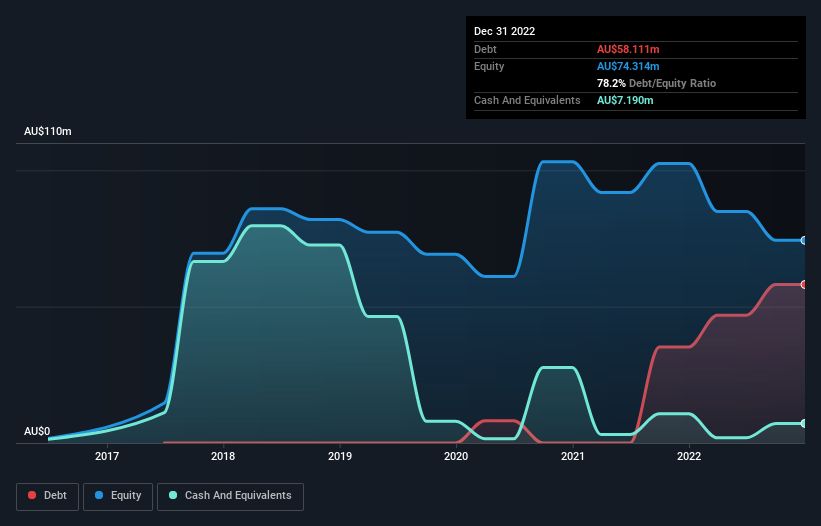Some say volatility, rather than debt, is the best way to think about risk as an investor, but Warren Buffett famously said that 'Volatility is far from synonymous with risk.' So it seems the smart money knows that debt - which is usually involved in bankruptcies - is a very important factor, when you assess how risky a company is. We note that Cann Group Limited (ASX:CAN) does have debt on its balance sheet. But should shareholders be worried about its use of debt?
When Is Debt A Problem?
Debt assists a business until the business has trouble paying it off, either with new capital or with free cash flow. Ultimately, if the company can't fulfill its legal obligations to repay debt, shareholders could walk away with nothing. However, a more usual (but still expensive) situation is where a company must dilute shareholders at a cheap share price simply to get debt under control. Having said that, the most common situation is where a company manages its debt reasonably well - and to its own advantage. The first step when considering a company's debt levels is to consider its cash and debt together.
View our latest analysis for Cann Group
What Is Cann Group's Net Debt?
As you can see below, at the end of December 2022, Cann Group had AU$58.1m of debt, up from AU$35.2m a year ago. Click the image for more detail. On the flip side, it has AU$7.19m in cash leading to net debt of about AU$50.9m.

How Healthy Is Cann Group's Balance Sheet?
The latest balance sheet data shows that Cann Group had liabilities of AU$21.9m due within a year, and liabilities of AU$46.3m falling due after that. On the other hand, it had cash of AU$7.19m and AU$3.13m worth of receivables due within a year. So it has liabilities totalling AU$57.9m more than its cash and near-term receivables, combined.
This deficit is considerable relative to its market capitalization of AU$71.9m, so it does suggest shareholders should keep an eye on Cann Group's use of debt. Should its lenders demand that it shore up the balance sheet, shareholders would likely face severe dilution. The balance sheet is clearly the area to focus on when you are analysing debt. But you can't view debt in total isolation; since Cann Group will need earnings to service that debt. So when considering debt, it's definitely worth looking at the earnings trend. Click here for an interactive snapshot.
In the last year Cann Group wasn't profitable at an EBIT level, but managed to grow its revenue by 64%, to AU$14m. With any luck the company will be able to grow its way to profitability.
Caveat Emptor
Even though Cann Group managed to grow its top line quite deftly, the cold hard truth is that it is losing money on the EBIT line. Its EBIT loss was a whopping AU$33m. Considering that alongside the liabilities mentioned above does not give us much confidence that company should be using so much debt. So we think its balance sheet is a little strained, though not beyond repair. Another cause for caution is that is bled AU$35m in negative free cash flow over the last twelve months. So in short it's a really risky stock. The balance sheet is clearly the area to focus on when you are analysing debt. But ultimately, every company can contain risks that exist outside of the balance sheet. Case in point: We've spotted 4 warning signs for Cann Group you should be aware of, and 2 of them can't be ignored.
When all is said and done, sometimes its easier to focus on companies that don't even need debt. Readers can access a list of growth stocks with zero net debt 100% free, right now.
New: AI Stock Screener & Alerts
Our new AI Stock Screener scans the market every day to uncover opportunities.
• Dividend Powerhouses (3%+ Yield)
• Undervalued Small Caps with Insider Buying
• High growth Tech and AI Companies
Or build your own from over 50 metrics.
Have feedback on this article? Concerned about the content? Get in touch with us directly. Alternatively, email editorial-team (at) simplywallst.com.
This article by Simply Wall St is general in nature. We provide commentary based on historical data and analyst forecasts only using an unbiased methodology and our articles are not intended to be financial advice. It does not constitute a recommendation to buy or sell any stock, and does not take account of your objectives, or your financial situation. We aim to bring you long-term focused analysis driven by fundamental data. Note that our analysis may not factor in the latest price-sensitive company announcements or qualitative material. Simply Wall St has no position in any stocks mentioned.
About ASX:CAN
Cann Group
Engages in the breeding, cultivation, manufacture, and sale of medicinal cannabis in Australia and Europe.
Medium-low risk and slightly overvalued.
Market Insights
Community Narratives



